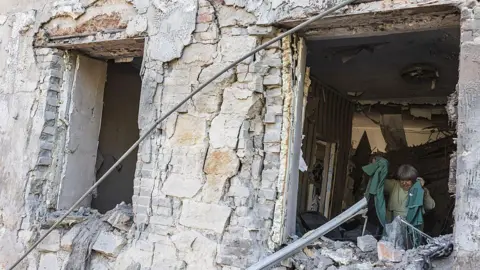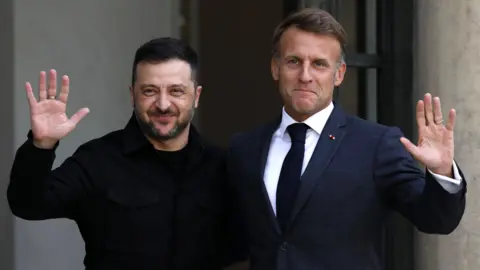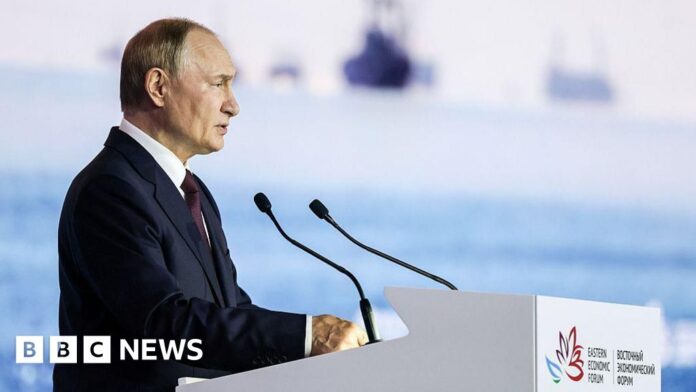Paul KirbyEurope digital editor
 VLADIMIR SMIRNOV/TASS/HANDOUT
VLADIMIR SMIRNOV/TASS/HANDOUTRussian President Vladimir Putin has rejected Western proposals for a “reassurance force” in Ukraine the day after any ceasefire comes into place, following a Paris summit aimed at finalising plans for security guarantees.
French President Emmanuel Macron said 26 of Ukraine’s allies had formally committed to deploying troops “by land, sea or air” to help provide security the moment fighting was brought to a halt.
He did not detail any of the countries involved.
Putin sought to quash the allies’ initiative, with a warning that any troops deployed to Ukraine would be “legitimate targets”, especially if they appeared now, even though there are no plans for an immediate deployment.
There seems little hope of a ceasefire for now, after last month’s summit in Alaska between Putin and US President Donald Trump briefly raised hopes of a meeting with Ukraine’s Volodymyr Zelensky and a potential peace deal.
Putin said on Friday he was ready for contact with the Ukrainian leader “but I do not see much point. Why? Because it is nearly impossible to reach agreement with the Ukrainian side on key issues”.
Trump then posted on social media that it “looks like we’ve lost India and Russia to deepest, darkest China”, above an image of the three countries’ leaders at a summit in Tianjin on Tuesday.
Putin’s spokesman, Dmitry Peskov, praised Trump’s “very constructive efforts” in finding a solution, but attacked “the outrageous efforts of European countries to provoke continuation of the war”.
Since the Alaska meeting, the “Coalition of the Willing” – led by the UK and France – has been working intensively on providing Kyiv with guarantees if an agreement is reached. These would involve strengthening Ukraine’s military as well as providing a “reassurance force” to patrol any deal.
Macron stressed any troops would be deployed to prevent “any new major aggression” and not at the front line. The force “does not have the will or the objective of waging war against Russia”, he said.
Zelensky described the decisions taken at Thursday’s Paris meeting as the first concrete step and said on Friday that thousands of foreign troops would be deployed, although it was premature to talk about it.
The US has not given details of its involvement. The French president said that would be finalised in the coming days.
Trump recently indicated that US backing could “probably” come in the form of air support, and although he made no comment after the Paris summit, Zelensky said he had spoken to the US leader about “maximum protection for Ukraine’s skies”.
Trump said he was “having a very good dialogue” with Putin and planned to speak to him in the near future. Putin confirmed on Friday that he had “an open dialogue” with the American president.
 Anadolu via Getty Images
Anadolu via Getty ImagesKyiv believes a ceasefire should be agreed in Ukraine before any attempt at securing a broader peace deal, although Russia disagrees.
Answering questions at an economic forum in Vladivostok in Russia’s far east, Putin argued that “if decisions are reached that will lead… to long-term peace, then I simply don’t see the point in [foreign troops’] presence [in Ukraine]”. He added that Russia would comply with any decisions leading to long-term peace “in full”.
Ukraine and its Western allies are unlikely to find his words convincing.
Putin also maintained he was ready to host a summit with Ukraine in Moscow, and offered to provide security.
When the BBC’s Steve Rosenberg suggested to Putin’s spokesman that the proposal indicated that Russia was more interested in Ukraine’s capitulation than a peace deal, Peskov answered: “Not at all, not at all. He’s invited to Moscow to talk, not to capitulate.”
Zelensky has already ridiculed Moscow’s idea as proof that Putin is not serious. Several neutral capital cities have been suggested instead, but Putin has complained of “excessive demands”.
“We support any format, bilateral meeting, trilateral meeting, I believe that Russia does everything to defer it,” Zelensky said.
Western leaders also believe that Russia is playing for time in a bid to seize more Ukrainian territory, as its 42-month full-scale war grinds on.
Putin, who spent Wednesday with China’s Xi Jinping and North Korean leader Kim Jong Un, maintains that his country’s military is pushing forward on all fronts in Ukraine.
 Getty Images
Getty ImagesAs well as making clear that no Western forces should be deployed to Ukraine, Moscow has insisted that it should be one of the countries acting as “guarantors” of Ukrainian security – an idea rejected by Kyiv and its allies.
Putin’s spokesman told the BBC that any foreign forces, whether belonging to Nato or otherwise, would be a danger to Russia “because we are an enemy of Nato”.
Nato chief Mark Rutte said on Thursday that Russia had no veto on Western troops being deployed to Ukraine: “Why are we interested in what Russia thinks about troops in Ukraine? It’s a sovereign country. It’s not for them to decide.”
Few countries have openly promised to deploy troops on the ground in Ukraine in the event of a deal, and the US has already ruled out such a move. European diplomats have suggested that committing troops at this point would probably help Putin’s narrative against the West.
However, UK Prime Minister Sir Keir Starmer said Western allies now had an “unbreakable pledge” to Ukraine, backed by the US, and had to press Russia to end the war, according to a Downing Street spokeswoman.
German Chancellor Friedrich Merz said following the meeting that the first priority was to secure a ceasefire at a summit involving Zelensky, and then provide “strong security guarantees”.
More than three-and-a-half years after Russia’s full-scale invasion of Ukraine, Putin said this week there was “a certain light at the end of the tunnel” and that “there are options for ensuring Ukraine’s security in the event the conflict ends”.
But he appeared to cast doubt on Friday on the likelihood of any deal being reached, blaming Ukraine’s requirement to have any change to its territories confirmed by a referendum and lifting of martial law.
Russia has illegally annexed five Ukrainian territories, but only has full control of one of them, Crimea.
UK Defence Secretary John Healey has praised Trump, who he says “brought Putin into talks” and “not closed off any options”.
Russia has rejected the idea of an initial ceasefire, insisting its campaign will not end before a full peace deal.
A source at the Élysée Palace suggested ahead of Thursday’s talks that there were several historical examples of ceasefires that had lasted without a full peace agreement.
The source pointed to the demarcation line between North and South Korea, where a ceasefire had lasted for years with a powerfully armed, allied American deployment serving as a signal to North Korea.
That concept was extremely important for the Ukrainians, the source added.



